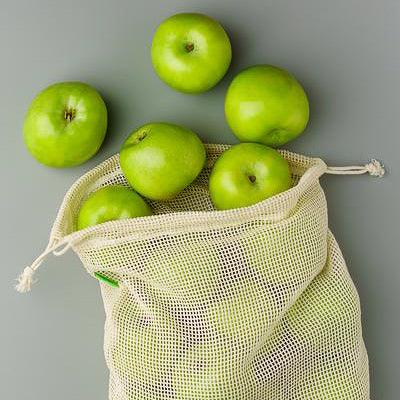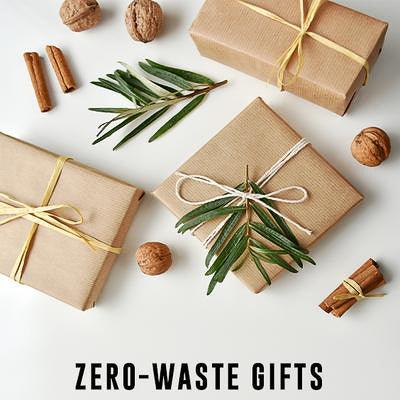Many people have enough environmental awareness to know this: plastic bags aren’t great. But why, exactly? What’s the harm in using them? And they’re everywhere, it seems, so...what do we, the consumers, do about it?
It may seem like an overwhelming problem with no solution in sight, but fear not - your consumer choices do matter, and more than you think. If the average American uses one plastic bag per day (which they do), then what does sticking with a reusable bag for one year do? It spares the environment a grotesque 365 plastic bags in the ground, in landfills, or in the oceans.
So, what’s the big deal about using reusable produce bags instead? Let’s walk through what brought us to a worldwide obsession with plastic, how it’s harming us and our environment, and reasons why to make the swap for reusable bags.

Why plastic bags?
Consciously or not, we tend to reach for plastic bags for a number of reasons, whether at the grocery store, at the stores we patronize, in the restaurants we frequent, or in our cabinets we stock at home.
A big part of the fight to rid the world of them, we know, is the convenience factor. When you need a quick throw-it-all-in-so-I-can-free-my-hands solution, you’re bound to reach for the first item available, and that tends to be a plastic grocery bag. They are cheaply manufactured, and therefore readily available, making them one of the most prevalent consumer items. But moves are being made to change that. Slowly, grocery chains are more readily offering paper bags and charging small fees for using plastic ones.
But it’s a slow process. A growing number of major corporations are seeing the long-term return of investing in sustainability measures, but by and large, these entities value profit and their bottom line. Items made for containing, storing, transporting their product that are cheap, fast-produced, and mass-produced are typically more profitable for them.
How they’re bad
It’s no secret: we have a waste problem, and it’s rotting our planet. It may shock you to learn that one plastic bag takes 500 years to break down. Yep, you read that right. (I knew my pet tortoise would outlive me if it could make it to another 50 to 100 years, but it never occurred to me that my plastic shopping bag will outlast me by far, far longer.)
Sometimes, though, numbers alone aren’t enough. Picture this: landfills the size of football fields (some even bigger), with mountains of trash as high as a two-story house. And mankind is running out of space to put their garbage.
A note for those who do try to recycle their plastic bags: your heart’s in the right place, and if you cannot avoid using plastic bags, keep up the effort to recycle them. I was an avid plastic recycler (still am - every bit counts in the end), and encouraged all of my roommates to set aside their surplus bags in a large one that I’d tie to a closet door handle. When it filled, I’d take it to a recycle center that accepts plastic bags (often Walmart or Target, which accept high and low density film such as plastic bags and bubble wrap). Most recycle centers, however, do not accept plastic bags, but a few do have specially-designated recycle kiosks solely for those materials.
Nothing felt more satisfying or responsible than tossing months of accumulated plastic bags from our household into a specific place that accepts them, fully faithful they would be carried onward to a better life, recreated into something else.
However, it’s often not convenient to make an extra trip for a recycle drop-off. And when the COVID-19 pandemic hit the States, my trusty Target recycle kiosks was closed due to, presumably, slowed processing and therefore less capacity to continue accepting them. Even recycling production was shrunk by the pandemic.
Also, not all plastics recycle equally. Some are more easily converted to new materials than others, some are rejected by all but a few centers scattered throughout the United States. It’s important to read the labels on their packaging, which indicate what type of plastic they are and thus, their likelihood of recyclability.
In the end, if items as small as plastic straws or dental floss can wreak their own havoc in the environment, imagine what a single plastic bag can do over the course of five centuries.
We get it - plastic bags are everywhere, and the notion to eliminate them seems daunting. Collectively, however, small tweaks in consumer product use throughout the household make quite a difference. With a bit of creativity, we can all can lower our waste output significantly.

Detail the reusable bag
Meet the reusable produce/laundry/shopping bag: the solution to our worldwide plastic conundrum. It can be made from cloth, mesh, or even recycled plastics. Their sturdy build and long lifetime (referring to its “usability lifetime”, not its 500-year “breakdown timeline”).
Further, they look much nicer. It’s far more pleasant to have a casual and friendly-looking cloth bag slung on your shoulder - something you can customize, be it by color, pattern, or message - than a lousy, plain plastic grocery bag. Stand out! And if you find the noise of crinkling bags bothersome, reusable bags are typically far less noisy, if they make any sound at all.
And, of course, you’re spared the extra chore of hauling your plastic bag buildup to a recycle center that accepts them. In all, you’re experiencing better feel, sound, product lifetime,
For groceries
Reusable produce bags are a great alternative to the plastic produce bags available at most grocery stores. Trader Joe’s, one of the leading eco-friendly grocery retailers, overhauled their packaging initiatives and in doing so, swapped plastic for compostable produce sleeves. They are great for carrying lighter loads, and can be tossed with the food scraps into your compost bin or buried directly in soil.
But mesh bags are stronger, more durable, and can hold greater quantities of items without tearing, compared to compostable bags. The one-time cost of purchase pays itself over, repeatedly, over the course of the continual rhythm of using it on your trips grocery store.
For household
Folks typically keep plastic bags in the house for a few primary reasons: lackadaisical acquisition, and trash can liners. Yes, you read that correctly. For the former, the multitude of businesses that hand out plastic bags with their products - restaurants for take-out food, retail stores, grocery stores - means their customers can quickly amass a collection of them without a single member of the household noticing. And, conveniently as always, they are the free and available item with which to line your small trash cans.
Even for the eco-conscious, this pattern can be tricky. Using a largely un-environmentally friendly item to contain household trash is mixing the environmentally bad with the potentially reusable goods. Mixing recyclables and non-recyclables is a no-no: tossing the first in with the latter creates more unnecessary waste that swell our landfills, and tossing in the latter with the former contaminates a “good batch,” or one that could have been repurposed at a plant.
One solution is to be diligent with bringing all materials in the house - not solely those in the kitchen - to your designated recycling receptacle. You can do this by placing separate containers throughout the house for just those materials, without using a plastic bag liner. If you prefer to have a trash bin liner, you can also keep the plastic bag if you already have one, and simply empty that trash can without tossing the bag out with the trash.
How to swap successfully
Developing sustainable household habits takes some effort, but, as we’ve discussed, the habit of adopting eco-friendly bags is requisite. Given the obvious benefits, this one is not only well worth your time, but also creates positive effects that will contribute to your legacy on this planet.
Here are a few tips to make the swap without looking back:
-
Keep them everywhere. Having extra bags in your purse, the trunk of your car, your desk at work, and your kitchen will guarantee that one is always available to you. Plastic bags are always available and offer convenience as a result. But if you make your reusable options equally available, switching to the eco-friendly version will be a no-brainer.
- Select a pretty one. ...or at least ones you enjoy looking at. Items you find visually appealing tend to get more use. Why not make it part of your overall ensemble of “casual tree hugger chic”?
Whatever way you want to make it your own, the rewards of a healthier planet (and a less cluttered house) are priceless. Seek Bamboo's zero waste lifestyle aims to do with one bag at a time!
Conclusion
Bottom line: plastic bags are trash. Do the planet a favor, and trade ‘em for eco-friendly bags, be it for produce, laundry, shopping, or household use. Cotton produce bags eliminate the cluttered look of plastic bags in your home, are sturdier, stronger, and last longer. You’ll do the environment a bigger favor than you may see.




